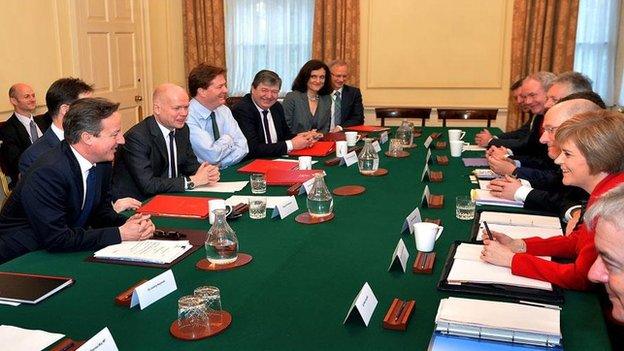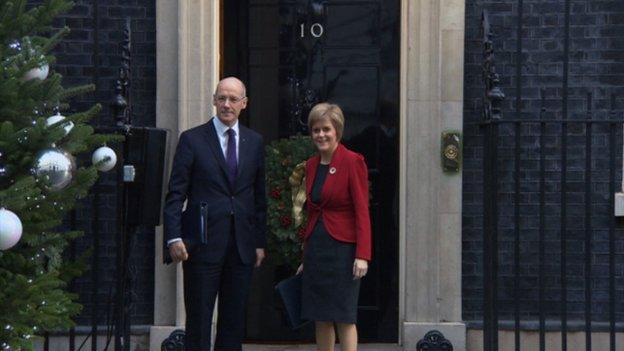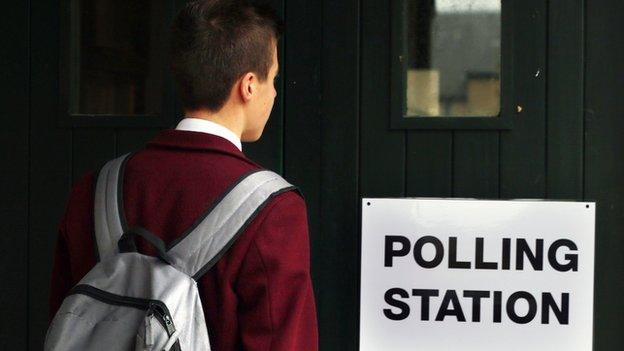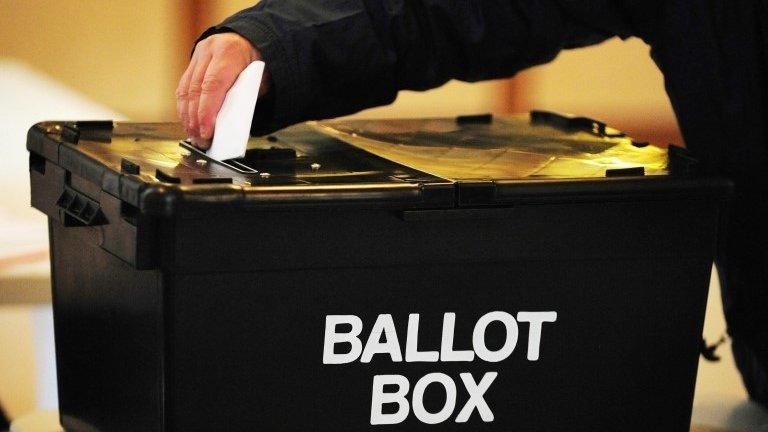David Cameron accepts Scottish Parliament votes at 16
- Published

David Cameron and Nicola Sturgeon met at Downing Street as part of the Joint Ministerial Committee
Prime Minister David Cameron is to give the Scottish Parliament the power to lower the voting age in time for the 2016 election.
He confirmed the move in a meeting with First Minister Nicola Sturgeon at Downing Street.
The UK and Scottish governments described the first face-to-face talks between Mr Cameron and Ms Sturgeon as "cordial and constructive''.
The two leaders also decided to look further at welfare reform in Scotland.
Voters aged 16 and 17 took part in the Scottish independence referendum.
A process known as a section 30 order will be used to give the Scottish parliament the power to change the voting law.
Such a mechanism was used to give Holyrood the power to hold the referendum.

ANALYSIS
By Glenn Campbell, BBC Scotland political correspondent
The prime minister does not personally support lowering the voting age.
David Cameron thinks it is right to give young people a say in elections when they turn 18.
Scottish Conservative leader Ruth Davidson takes a different view.
Having allowed 16 and 17-year-olds to vote in the independence referendum, she thinks they should be allowed to take part in Scottish Parliament elections.
All five Holyrood parties called for the relevant powers to be devolved in "sufficient time" for changes to be made for the 2016 election.
It is this recommendation - contained in the Smith commission agreement - that the prime minister intends to honour.
In doing so, he may strengthen the argument of those campaigning to extend the franchise for UK general elections.
Both Labour and the Liberal Democrats have already committed to making 2015 the last Westminster election to exclude 16 and 17 year olds.

Ms Sturgeon held bilateral talks with Mr Cameron in Downing Street after attending a meeting of the Joint Ministerial Council, which brings together UK ministers and the leaders of the devolved administrations.
Speaking after the talks, Ms Sturgeon said there were many things she and David Cameron would disagree about, but the talks had been useful.
"I have come out of the meeting very confident that we will get the devolution of power to extend the franchise to 16 and 17-year-olds in time for that to happen for the 2016 election," she said.

Nicola Sturgeon, along with her deputy John Swinney, was at Downing Street for the talks
"I have made very clear that the Scottish government wants to be very involved in taking forward the Smith proposals, albeit we will continue to argue that they don't go far enough.
"So all in all, a constructive set of discussions and hopefully we can build on them."
Following the meeting, Scottish Secretary Alistair Carmichael said that Ms Sturgeon's election as first minister provided an opportunity to "re-set" the relationship between Holyrood and Westminster following the confrontations under Mr Salmond.
"It takes two to re-set a relationship. I believe that Nicola Sturgeon will be much more constructive and co-operative to work with," he said.
A No 10 spokesman said: "The PM made clear that he wants to work with the first minister, forging even stronger ties between our governments and our parliaments and working together on the big issues for the future of Scotland and the United Kingdom."
Responding to the news that Holyrood is to get the power to lower the voting age, shadow Scottish Secretary, Margaret Curran MP, said: "Scottish Labour called for this change to be made and we welcome this announcement by the UK government.
"We will fully support any legislation required to make it happen."
- Published9 December 2014

- Published8 December 2014

- Published1 December 2014

- Published23 September 2014
